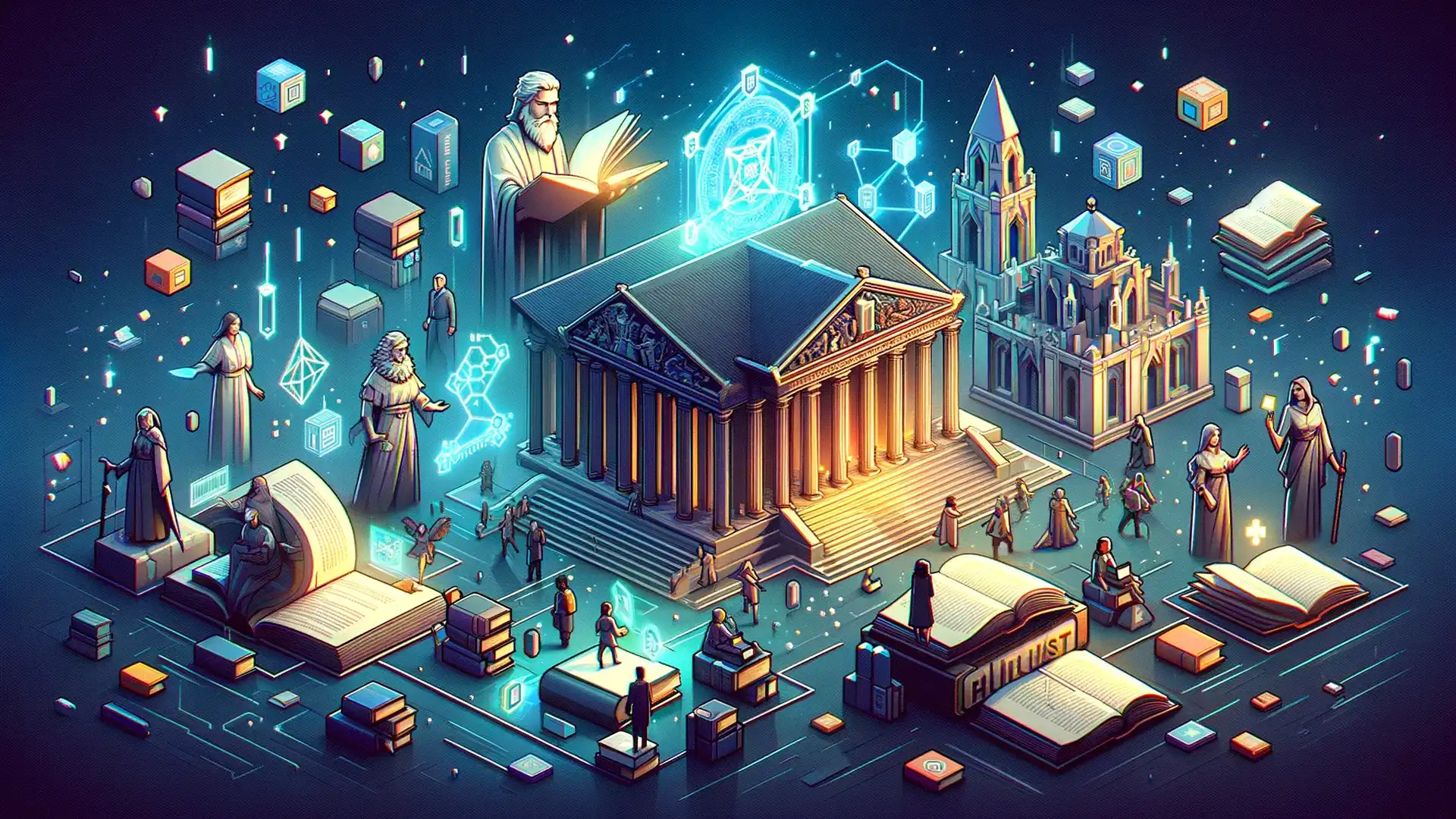Building Trust with NFT Credentials: How It Works

 Author:
Artem Grigoriev
Author:
Artem Grigoriev
Understanding and Leveraging NFT Credentials: Building Trust in the Digital Age
The groundbreaking concept of NFT credentials (unique digital certificates) is revolutionizing how we verify qualifications and identities in our increasingly digital world. NFT, or Non-Fungible Token, credentials are unique digital assets securely stored on a blockchain. A blockchain is a system for recording information in a way that makes it difficult or impossible to change or hack.
📘 This article complements: "The Complete Guide to NFT Credentials". Explore it to find answers to all your questions;)
This advanced technology ensures each credential is authentic (genuine), immutable (meaning it cannot be altered), and tamper-proof (cannot be tampered with). By leveraging blockchain, NFT credentials provide a secure, decentralized method for verifying achievements and identities. This significantly enhances trust in digital transactions.
According to a report by Gartner , the NFT market is expected to grow significantly. This underscores the increasing adoption and impact of this technology.
Building trust through secure and immutable verification processes is one of the primary benefits of NFT credentials. Traditional credential systems often grapple with issues like fraud (fake credentials) and lengthy verification processes. With NFT credentials, each credential is stored on a blockchain. This creates a permanent, unalterable record that can be verified in real-time.
Anyone needing to check the credential can do so instantly and be confident it is genuine. This enhanced transparency reduces the risk of fraud and enhances the reliability of the information. The World Bank has highlighted the potential of blockchain to transform credentialing. This is by reducing fraud and improving overall efficiency.
To robustly protect against credential fraud, NFT credentials utilize cryptographic security . They use complex mathematical algorithms to secure the data, making each credential unique and nearly impossible to duplicate or alter without detection. This is crucial for maintaining the integrity of the credentialing process.
Smart contracts are self-executing contracts with terms directly written into code. They ensure credentials are issued and managed according to predefined rules, adding an extra layer of security and trust. Essentially, smart contracts automatically enforce the rules and regulations governing the credential without the need for a middleman.
The Harvard Business Review discusses the pivotal role of smart contracts in enhancing the security and reliability of digital credentials.
Sharing traditional credentials often involves cumbersome processes. For example, you might have to request an official transcript from your school. You then wait for it to be mailed and send it to your employer. NFT credentials streamline this process by allowing instant, secure sharing of verified credentials. This not only saves time but also reduces the administrative burden on both individuals and institutions.
💡 Note: NFT credentials can be easily shared and verified through digital wallets. This simplifies the process and reduces administrative burdens. You can store your credentials in a secure digital wallet on your phone or computer. This allows you to share them quickly and securely with anyone who needs to see them. This ease of sharing and verification makes the entire process more user-friendly and efficient.

A study by IBM found that blockchain-based credentials could reduce administrative costs. They also improve efficiency in credential verification.
For employers and institutions, confidence in credential authenticity is paramount. Employers can quickly verify the authenticity of an applicant’s credentials, ensuring they are accurate and up-to-date. This increased confidence leads to better hiring decisions and more efficient talent management. Educational institutions benefit by having a reliable way to issue and verify degrees, certificates, and other qualifications. This enhances their credibility and trustworthiness.
User control and privacy are significant advantages of NFT credentials. Unlike traditional systems, where third parties often control access to credentials, NFT credentials empower individuals to control their information. This means you decide when and with whom to share your credentials, significantly enhancing privacy and data protection.
Global recognition, interoperability, and lifelong learning are key features of NFT credentials. These credentials can be recognized and verified globally, breaking down geographical barriers and facilitating international mobility. Interoperability ensures that credentials can be easily integrated across different platforms and systems. This means your credentials can be used and recognized in various systems worldwide.
Additionally, NFT credentials support lifelong learning. They provide a comprehensive, verifiable record of an individual’s learning achievements over time, regardless of where or how they were acquired. This way, all your learning achievements are documented and easily accessible throughout your life.
For academic and professional communities, NFT credentials offer numerous benefits. In academia, they provide a secure way to issue and verify educational achievements, enhancing the value of qualifications. In professional settings, they offer a reliable method of validating skills and experiences. This fosters trust and credibility within the workforce. By leveraging these benefits, institutions and employers can create a more efficient and trustworthy environment for credential management.
NFT credentials are pivotal in enhancing trust in digital transactions. They lead to a more transparent, secure, and efficient system for credential verification and management. By leveraging blockchain technology, these digital credentials offer a new paradigm. They address many of the challenges faced by traditional credential systems. They are a valuable tool in the digital age.
The OECD has explored the impact of blockchain on education. This highlights its potential to improve the security and efficiency of credential verification.
💡 Tip: When adopting NFT credentials, it is crucial to consider the readiness of the legal systems. The potential need for new regulations to support this transformative technology should also be considered. Being proactive in understanding and addressing legal implications can ensure a smoother transition. This leads to broader acceptance of NFT credentials.

Practical Applications and Future Directions of NFT Credentials
NFT credentials are rapidly gaining popularity across various industries. They offer a secure, decentralized (spread across many computers), and easily verifiable method of credentialing.
Education is one area where NFT credentials are making a significant impact. Universities are now issuing digital diplomas using NFT technology. This enhances the security of academic records and simplifies the verification process for employers and other institutions. Instead of waiting days or weeks for verification, employers can confirm credentials almost instantly. This speeds up processes, reduces administrative work, and makes life easier for both graduates and employers.
A study by the European Commission highlights the successful use of blockchain-based credentials in many European universities, proving the benefits of this innovative technology.
In the professional world , companies utilize NFT credentials to verify employee certifications and skills. This ensures a clear and reliable hiring process. Employers can quickly verify job candidates' credentials, building trust and expediting hiring decisions. This is especially crucial in critical industries like healthcare and IT, where validating expertise is essential.
A report by PwC indicates that blockchain technology, including NFT credentials, is transforming the hiring process by providing a reliable method for verifying credentials.
Integration with current systems is another crucial aspect. Interoperability (the ability to work with other systems) with technologies like Learning Management Systems (LMS) and Human Resource Information Systems (HRIS) ensures a smooth user experience. Institutions and companies can incorporate NFT credentials into their existing systems without needing to overhaul them completely, easing the transition.
The IEEE is working on standards to ensure blockchain technologies function well in both educational and professional settings.
Real-world stories illustrate both the benefits and challenges of NFT credentials. Students and professionals appreciate the ease of sharing their verified achievements through digital wallets (secure digital storage on your phone or computer). This simplifies the process of proving qualifications to employers or educational institutions. However, there are challenges, such as initial setup costs and the need for widespread acceptance.
💡 Note: NFT credentials, with their decentralized nature, use blockchain technology to provide a trust system that does not rely on a single central authority. This promotes a more secure and transparent process, essential for maintaining the credibility of the credentialing process.

A case study by Deloitte details the efficiencies gained and obstacles faced in implementing blockchain-based credentialing systems.
For example, users of Credly, a platform for issuing NFT credentials, praise its convenience and reliability. Credly acts as a trusted third-party provider, ensuring global recognition and trust in issued credentials. This underscores the importance of reputable platforms bridging traditional and digital credentialing systems.
Smart contracts (self-executing agreements coded on the blockchain) enhance NFT credentials' utility. They automate the issuance and verification processes. These agreements are embedded in the blockchain, reducing the risk of human error and fraud. The conditions for issuing the credential are programmed into the blockchain. Once these conditions are met, the credential is automatically issued without manual intervention.
Privacy is also crucial, as users control who can access their credentials, protecting their sensitive information. According to MIT Technology Review , smart contracts are vital for ensuring the security and efficiency of blockchain-based credentialing systems.
Looking ahead, the future of NFT credentials is promising. Emerging technologies like artificial intelligence (AI) and machine learning (ML) are expected to further enhance NFT credentials. They will make the verification process even more robust and efficient. These technologies have the potential to revolutionize how we manage and verify qualifications, providing deeper insights and improving overall reliability.
Additionally, NFT credentials could revolutionize reputation systems . They provide a clear and unchangeable record of a person’s achievements and qualifications. This universal recognition and trust can facilitate global mobility and international collaboration.
The World Economic Forum discusses the future impact of NFT credentials on global credentialing and reputation systems, highlighting their potential to support international cooperation. This can lead to more inclusive and diverse work environments where talent from different regions is easily recognized and valued.
In conclusion, NFT credentials are poised to revolutionize many sectors. They provide a secure, efficient, and trustworthy method of credential verification. As they gain acceptance, platforms like Credly will play a key role in their adoption, offering robust solutions that connect traditional credentialing systems with the new possibilities of blockchain technology.
This chapter highlights the real-world applications, user experiences, and future directions of NFT credentials. It showcases their potential to transform credential verification and management. Ongoing advancements in blockchain, AI, and ML will make NFT credentials even more powerful, establishing them as an essential tool in the digital age.
💡 Tip: As NFT credentials become more popular, it's important to consider the readiness of legal systems. New regulations may be needed to support this technology. Stakeholders should stay informed about legal developments to ensure compliance and maximize the benefits of NFT credentials. Engaging with policymakers and participating in regulatory discussions can help create a legal framework that supports the growth and acceptance of NFT credentials.

NFT Credentials in Experiential Learning and Internships
Synergy in Collaborative Projects Through NFT Credentials
NFT Credentials: A Guide for Students and Educators
The Role of TTP in the Global Recognition of NFT Credentials
The Impact of NFT Credentials on Traditional Education Systems
